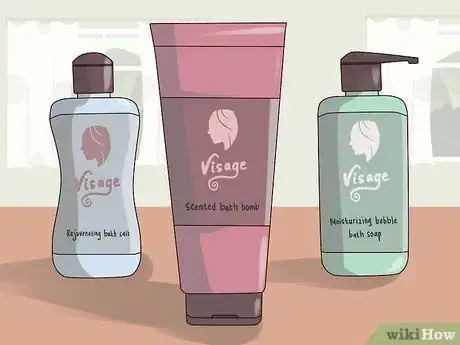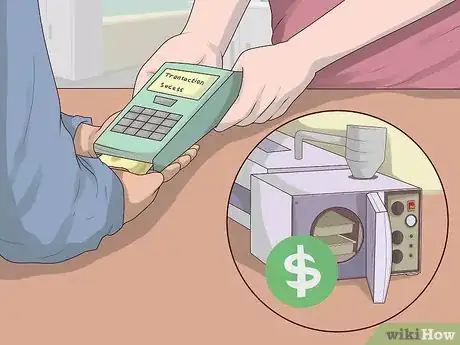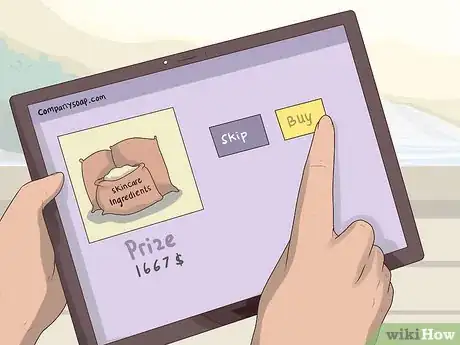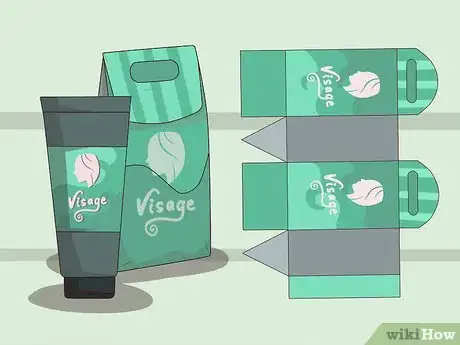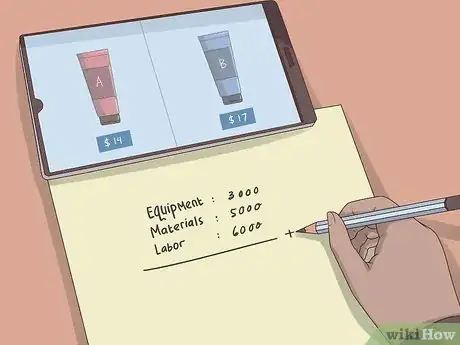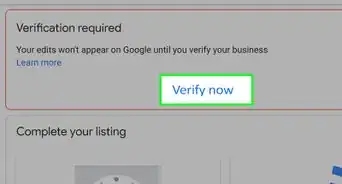This article was co-authored by wikiHow Staff. Our trained team of editors and researchers validate articles for accuracy and comprehensiveness. wikiHow's Content Management Team carefully monitors the work from our editorial staff to ensure that each article is backed by trusted research and meets our high quality standards.
There are 14 references cited in this article, which can be found at the bottom of the page.
This article has been viewed 21,584 times.
Learn more...
Are you a beauty guru looking to start your own skincare line? The skincare industry is growing quickly and there are tons of niche markets for specific products, which means you can make and sell your own! To start a skincare business, come up with a product line that you think you can sell successfully. Plan out your business by writing down your goals, doing your research, and taking care of any financial and legal requirements. You also need to figure out how you’re going to make your products and put together a business plan so you can pitch to investors to secure startup costs. To sell your product, you can set up a retail storefront, organize skincare parties, or harness the power of the internet!
Steps
Developing a Product Line
-
1Choose a hero product that will be the main focus of your business. A hero product, or a star product, is the main product that you sell. Choose a product that you have some knowledge or experience with so you have an idea of how it works and how to make it. For instance, if you use natural skin moisturizers for your dry feet that you make yourself, starting a skin care line of natural foot creams could fit right into your skillset.[1]
- Decide what your hero product will be based on your own expertise and knowledge as well as your market research.
-
2Add products to your line that support your hero product. Choose additional products that you can sell in support of your hero products so you have a variety of different, but related products. For example, if your hero product is a scented bath bomb, you could also choose support products like moisturizing bubble bath soap, or rejuvenating bath salts.[2]
- Adding support products to your skin care business will promote your main product and increase your potential revenue.
Advertisement -
3Research how to make your products online. Learn as much as you can about your product so you know it inside and out, including all of the ingredients that go into making it so you’re fully informed. Research similar products on the market to see how they’re made to give yourself a starting point.[3]
- Knowing your product will make your business seem more professional and will help you when you pitch your products to potential investors and customers.
-
4Come up with a name and logo for your business and products. Spend some time brainstorming potential names for your skin care business until you’ve found one that you’re happy with. Even if it’s just a working name that you plan to change later, give a name to your skin care business to make it feel more real and keep you motivated. Then, sketch out an idea for your logo, which will be the visible representation of your brand. Think of names for your products as well and try to make them fit your overall brand.[4]
- A great business name can help define your product line and is essential for building a successful brand.
Example: If you’re starting a skin care business selling facial creams, you could call it something like “Visage,” which is French for face. Your logo could be a side profile silhouette of a face to go along with the name. Then, if you plan to sell a line of anti-aging cream, you could name it “Visage Eternal.”
Establishing Your Business
-
1Write down goals for your business so you can stay on track. Set goals for what you hope to accomplish with your skin care business, whether it’s to start a small retail store in your hometown or to launch an online beauty conglomerate. Your goals will help guide your decisions and keep you focused and motivated.[5]
- Even though your goals may change over time, defining them in the beginning will keep you focused and help get your business established.
-
2Do market research to determine your target audience. Conduct market research to find out the niche market that your skin care business falls into. Identify your target audience to help guide your business and marketing strategies to sell your products to your customers.[6]
- For example, you could choose to sell a body lotion to older men, which would require an entirely different marketing strategy to sell successfully than an acne cream for young women.
Tip: Use skin care industry data from government sources such as the FDA, as well as information from trade organizations and publications related to the cosmetics industry to conduct your research.
-
3Get a business license so you can sell your products legally. In order to sell your products, you’ll need to obtain a business license that allows you to operate your business legally. Find out the requirements for your area, file the necessary paperwork, and pay the filing fee to receive your license.[7]
- You may have to wait for a week or so to receive your license.
- Failure to obtain a business license could cause you to face harsh fines, penalties, and possibly jail time.
-
4Set up a business banking account and keep track of expenses. Opening a bank account as a small business can help you easily track your expenses, make you more eligible for a small business loan through the bank you open the account with, and receive small perks and benefits from the bank. Visit a bank in your area to open up a business account.[8]
- Shop around the banks in your area to see which ones offer the best benefits for your business account.
Making Your Products
-
1Acquire the proper equipment to manufacture your own products. Research the hardware and machinery you’ll need in order to make your skin care products. Purchase the tools you need so you can make and sell your products.[9]
- Use the money that was invested to start your business to purchase the equipment you need.
-
2Find bulk suppliers for your ingredients to save on costs. Look online for companies that supply the ingredients you need in bulk and go to trade shows to meet suppliers that you can buy from. Purchase the ingredients you need so you can start manufacturing your skin care products.[10]
- Buying in bulk saves on costs in the long run.
-
3Manufacture your products yourself or hire people to work for you. Use a garage, shed, or rent a space you can use to set up your equipment and store your ingredients. Start making your line of products or hire and train people to make your products for you so you can focus on selling them.[11]
- When you’re first getting started, you may be able to enlist friends and family members to help you make your products.
- As you start to sell more and more of your products, you’ll make more money, which will allow you to hire more help to make more of your products!
-
4Follow regulatory guidelines regarding cosmetics. Governmental regulatory groups such as the FDA in the US have strict guidelines about the manufacture of cosmetics. Look online for any regulations you need to follow.[12]
- Make sure you follow the rules and regulations closely so you don’t face any fines or penalties.
Tip: Keep a copy of the regulations where you make your products so you can reference it if you need it.
-
5Design a packaging that is attractive and fits your brand. Come up with a unique style for the packaging of your products, to set your brand apart from the competition. Look online for freelance designers you can hire or design it yourself if you have an artistic vision.[13]
- The packaging that your products come in should represent your brand and be appealing to both new and existing customers.
- Make sure the packaging is also functional and easy to use.
Creating a Business Plan
-
1Write a description of your skin care business. Be honest, direct, and professional and describe how your skin care business is special and how it fits into the cosmetics market as a whole. Discuss your main products and why there is a demand for it. Talk about who your potential customers are as well as any competing companies or products on the market.[14]
- Avoid using flowery or exaggerated language in your description.
- For instance, if you plan to start a business selling an all-natural exfoliating body wash, you could draft a description that talks about the special ingredients such as, “Key West Cleanser uses the finest sand from Caribbean beaches to exfoliate the skin, which is a unique selling point that appeals to younger audiences.”
-
2Put together an operational plan for your business. An operational plan refers to how you plan to make and sell your skin care products. Discuss how your products are made, how you acquire the tools and materials to make them, and where they will be made. Calculate the costs of equipment and raw materials to make your products and include any additional costs that you have, such as shipping and delivery fees.[15]
- Look into how much renting a storefront or a place to manufacture your products would cost.
- You can also include goals for your future operations and costs such as potential retail space and hiring employees.
-
3Develop a pricing model for your products. Look at similar products on the market and see how much they’re selling for. Calculate the costs of equipment and raw materials as well as the labor it takes to produce your product. Come up with working numbers for what you plan to price your products when you sell them.[16]
- Your prices need to be relatively close to similar items on the market in order to be competitive.
- Potential investors need to see your pricing models to decide if your business is profitable enough to be worth their money.
-
4Come up with an effective marketing strategy. Create a marketing plan that describes how you will attract customers and sell your product. Talk about all of the types of marketing you plan to use and how you plan to use them. Describe how you’ll appeal to your target audience to get the word out about your product on the market. Compile all of your marketing plans into a single document so you can use it to attract investors.[17]
- You could use social media, email marketing campaigns, radio commercials, or any other type of marketing, but you need to explain how you plan to use them.
- Discuss why your marketing strategy is an effective one for your target customers. For instance, if you’re selling an acne facial wash for teenage boys, describe why your marketing strategy will get their attention.
-
5Research the legal requirements for starting your business. Starting up a skin care business has many of the same legal requirements of other businesses, including filing the proper tax paperwork and forming a business entity. But in the US, cosmetics are regulated by the Food and Drug Administration (FDA), so there are extra requirements you’ll need to satisfy. Look online for any government regulations you need to follow to start your business.[18]
- Consider hiring a lawyer to help you meet all of the legal requirements for starting your business.
-
6Make samples of your products for potential investors. Putting your product into the hands of potential investors will go a long way towards convincing them to invest in your business. Make a small sample of all of the products you plan to sell so you can bring them with you to hand out when you make your pitch to investors and customers.[19]
- Making your samples also gives you a chance to finalize what your product will look like.
Tip: Put the samples into containers with your logo and business name on them to give a glimpse of what the final products will look like!
-
7Pitch your skin care business to potential investors. Contact and schedule meetings to pitch your skin care business plan to venture capitalists, loan officers at a local bank, and other organizations such as the Small Business Administration. Present the description of your business, your operational and marketing plans, pricing models, and samples of your product.[20]
- Pitch your business idea to any potential investors you can find so you can secure the startup costs.
Selling Your Skin Care Products
-
1Rent a location to sell your products from a retail store. Look for a location that gets lots of foot traffic in an area that your target demographic frequents and has a rent you can manage. Set up your storefront with all of your skin care products and start selling to people directly.[21]
- Hire staff to work in the store and keep money coming in even when you aren’t there if you have the funds to do so.
-
2Set up a website to sell your skin care products online. Use a web hosting service such as GoDaddy.com, HostGator.com, or DreamHost to create a professional-looking website with a shop feature that you can use to sell your products to people through. Link all of your social media accounts to your website to drive traffic there.[22]
- Many services also have templates you can customize to create your website quickly and easily.
- Direct social media and online advertising to your website to make sales there as well.
Tip: Choose a domain name that includes your business name so people can remember it. For example, if your business is called “Bella’s Bath Bombs” then a good website domain name could be “bellasbathbombs.com.”
-
3Visit local stores and offer to sell your products to them wholesale. Call or send emails to local businesses to set up appointments so you can meet with them about your products. Take samples and pitch your skin care business to health and beauty supply stores. Offer to sell your products at a discounted wholesale price so they’ll carry them in their stores. If they accept, you’ll have a regular customer and will get more brand recognition![23]
- Create business cards with your name, your business and logo, and contact information for you to leave with potential customers.
-
4Organize skin care parties to sell your products. Organize a big party and invite as many people as you can that you think would be interested in buying your skin care products. Give out lots of free samples at your party to get people to try your products. Offer your products for sale at the party to sell directly to your guests.[24]
- Invite people in your target customer base. For instance, if you’re selling glittery moisturizing lotions, invite younger women to the event, who are much more likely to buy your product.
- Make the party super fun, with music, drinks, and food.
References
- ↑ https://youtu.be/JCzT5YsNpSA?t=40
- ↑ https://www.designhill.com/design-blog/top-10-tips-for-starting-your-own-cosmetics-business/
- ↑ https://startupjungle.com/how-to-cosmetics-business/
- ↑ https://www.forbes.com/sites/maryannreid/2018/02/28/sustainable-beauty-brand-founders-lessons/#54e539ad39f2
- ↑ https://bizfluent.com/how-5367838-start-skin-care-business.html
- ↑ https://bizfluent.com/how-5367838-start-skin-care-business.html
- ↑ https://www.sba.gov/business-guide/launch-your-business/apply-licenses-permits
- ↑ https://www.inc.com/aj-agrawal/how-to-open-a-business-bank-account-for-your-startup.html
- ↑ https://bizfluent.com/how-4826309-start-face-cream-business.html
- ↑ https://bizfluent.com/how-4826309-start-face-cream-business.html
- ↑ https://bizfluent.com/how-4826309-start-face-cream-business.html
- ↑ https://www.beautifulwithbrains.com/start-own-skincare-brand-interview-cheryl-woodman/
- ↑ https://bizfluent.com/how-5367838-start-skin-care-business.html
- ↑ https://www.entrepreneur.com/article/38308
- ↑ https://www.entrepreneur.com/article/38308
- ↑ https://www.entrepreneur.com/article/38308
- ↑ https://www.forbes.com/sites/richardkestenbaum/2019/04/01/indie-beauty-startup-trends-loreal-lauder-shiseido/#320ae9526347
- ↑ https://bizfluent.com/how-5367838-start-skin-care-business.html
- ↑ https://www.designhill.com/design-blog/top-10-tips-for-starting-your-own-cosmetics-business/
- ↑ https://www.inc.com/neil-parmar/5-ways-to-prep-for-a-big-business-pitch.html
- ↑ https://www.designhill.com/design-blog/top-10-tips-for-starting-your-own-cosmetics-business/
- ↑ https://www.forbes.com/sites/richardkestenbaum/2019/04/01/indie-beauty-startup-trends-loreal-lauder-shiseido/#320ae9526347
- ↑ https://www.entrepreneur.com/article/326954
- ↑ https://www.cleveland.com/style/2013/12/home_shopping_parties_a_new_cl.html

